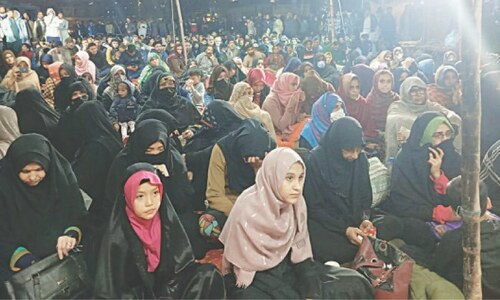KARACHI: Expressing concern over the plight of animals at Karachi Zoological Gardens, particularly elephant Noor Jehan currently battling for her life at the facility, experts associated with nature and wildlife conservation have called upon the government to take immediate steps for their welfare.
They also urged the government to develop zoo husbandry standards, engage a panel of independent but relevant experts to inspect facilities for captive animals and engage the provincial wildlife department to bring about improvement in animal care and management.
“While the World Wide Fund (WWF) is not a welfare organisation, we are extremely concerned about Noor Jehan’s critical condition. Elephants are usually acquired from the wild, caught as young animals, illegally traded through a network of dealers, and suffer tremendously in captivity,” said Rab Nawaz, senior director progammes at the WWF-Pakistan.
The suffering of the elephant at Karachi Zoo, he recalled, was a repetition of the story of Kavaan (translocated in 2022), Suzi at Lahore Zoo (died 2017), Saheli at Islamabad Zoo (died in 2012) and Anarkali at Karachi zoo (died 2006).
Plight of elephant Noor Jehan highlights lack of trained staff, appropriate diet, proper environment
“Zoos in Pakistan treat endangered wildlife species as ‘tender items’ and we have a history of elephants’ losses due to health problems; inappropriate diet, and limb and foot complications arising from insufficient exercise, shackling and inappropriate husbandry,” he said.
Citing studies carried out on elephants, the WWF official stated that the land’s largest mammal had complex ecological and social needs, and many zoos across the globe had closed down their elephant facilities and those keeping them housed them in large enclosures with correct social groups.
“Since the import of exotic mammals has now been banned in Pakistan, the country needs to bring in laws and standards for zoos, and strictly adhere to them. We do urge concerned authorities to build capacity in this field and equip zoos with appropriate infrastructure to improve the well-being of the animals,” he said.
Wild animals in zoos had an extremely crucial role in public education and in the promotion of conservation, he added.
Immediate action needed
According to WWF-P experts, the housing environment at Karachi zoo, during a recent visit to the facility, has been found to be unclean and unhygienic with most animals appearing underweight and lethargic and some with wounds that need to be addressed.
“The behaviour of animals suggested that they were not engaged with their environment and lacked adequate space and props to interact with,” Ghazi Salahuddin, regional WWF-P head, shared.
He added that zoo personnel seemed poorly trained, which further exacerbated the problem.
The experts emphasised the need for prioritising animal well-being.
“The welfare of these voiceless creatures, who rely entirely on human care for their survival, it is crucial to provide adequate skilled staff, infrastructure and funding to improve animals’ conditions, whether they are in the zoo or Safari Park. This will attract more visitors, which will ultimately generate more funds for animal welfare,” Rab Nawaz said.
The plight of zoo animals has been a subject of concern for decades, attracting little government attention. The recent case of elephant Noor Jehan currently suffering from an unknown disease has once again brought this issue to the fore. The zoo staff has no expertise to treat the animal and is waiting for the foreign experts who are expected to arrive in a few days.
Regulating zoos
The experts also pointed out that the country lacked legal standards on captive animals and that cruel practices to keep animals in cruel conditions couldn’t be challenged in court under the ‘Prevention to Cruelty to Animal Act, 1890’.
“The definition of animal in the 1890 act means any domestic or captured animal. As a society, we must come up with an enabling institutional framework that places emphasis on corrective mechanisms rather than criminal prosecutions.
“Prosecutions may punish wrongdoers but often ignore the welfare of the animal. The WWF strongly recommends that zoo husbandry standards be developed, and a panel of independent but relevant experts inspect all zoos in Pakistan based on those standards; giving the captive facilities due time to improve,” Mr Salahuddin said.
According to the experts, the overall management of the captive animals should be under the wildlife department, given that they have zoologists and staff with experience in handling and managing animals.
Shifting large animals to Safari Park
The experts believed that large animals, such as elephants, big cats, chimpanzees and a female bear presently housed in the zoo, should be shifted to Safari Park, which was less polluted in terms of noise and traffic emissions around it.
“This would help them thrive in a comparatively healthier environment. Moreover, efforts could be made to develop a botanical garden at the zoo, which has the distinction to be the only public place in the city having a large number of old trees,” Danish Rashdi, head of the IUCN (International Union for Conservation of Nature) Karachi Programme Office, said.
Tagging old trees with information about their species, age, their carbon sequestration capacity, might all form interesting facts and feats for visitors, he added.
“But, this called for the government to take the initiative, create a transparent mechanism for fund flow and effective utilisation, as part of its overall focus on revamping the zoo,” he said.
“It is also essential to loop in international species experts to get advice on animal well-being and their breeding. Till this happens, it will only be cruelty to keep animals and let them die due to unavailability of resources and proper care,” Mr Rashdi said.
Published in Dawn, April 3rd, 2023













































Dear visitor, the comments section is undergoing an overhaul and will return soon.